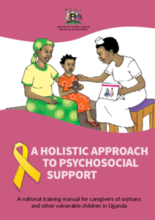This is the second edition of the manual, A Holistic Approach to Psychosocial Support – A national training manual for caregivers of orphans and other vulnerable children in Uganda. The first version of this manual was published by the Ministry of Gender, Labour and Social Development (MGLSD) in 2004. This manual takes into consideration the changing context and dynamics of OVC programming since the first edition.
Who is this manual for?
This manual targets both primary and secondary caregivers of OVC. Primary caregivers are people who are in daily and direct contact with the children in the family and community. They can be parents, teachers, or relatives who care for the child, including grandparents, aunts, uncles, and siblings. Secondary caregivers are those whose role is usually to support the primary caregivers. These can be volunteers or professionals working with children, such as social workers, child protection officers, probation and social welfare officers, community volunteers, and health workers. In this manual we refer to both groups simply as “caregivers”. The information in this manual is intended for both groups, as they share many of the same challenges and concerns in trying to provide psychosocial support to OVC.
Structure of the manual
This manual consists of five modules. Each of these has clearly outlined learning objectives. Each module consists of different sessions and includes session objectives, activities (divided into purpose, time required, instructions to the facilitator, and facilitator notes) and further resources for additional reading.
Methodology
The manual utilises various participatory learning methods, including group work, pictures, brainstorming, storytelling, lectures, debates, and case studies.
Development of this manual
This manual was developed by the Ministry of Gender, Labour and Social Development with support from TPO and REPSSI. The development process was consultative, involving other government line ministries, development agencies, civil society organisations at both national and regional levels, and district local governments. An interactive process involving feedback, revision, and validation was undertaken, resulting in this final version.
Guiding principles of this manual
This manual is based on the guiding principles of the National Orphans and Other Vulnerable Children Policy (NOP, 2004) as well as on the NSPPI II (2011-2016). It provides those who are unfamiliar with these policies an opportunity to learn more about them. The focus is on translating theoretical knowledge about the policies into practical actions to provide psychosocial support to orphans and vulnerable children.

